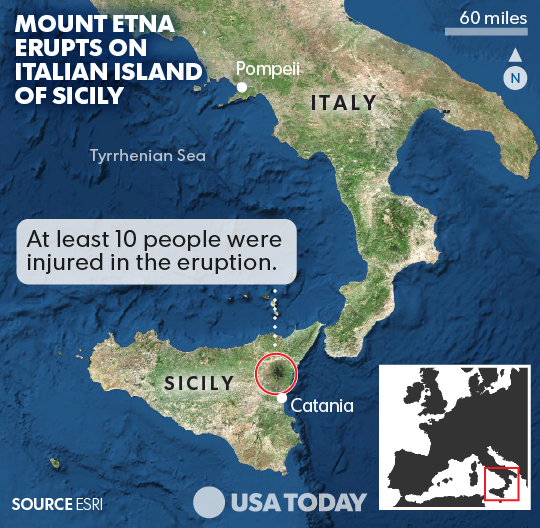
Embed
Share
Mount Etna has burst into life for the third time in just under three weeks, spitting molten lava nearly 200 metres (650 feet) into the sky above Sicily. Video provided by AFP Newslook

A photo taken on Tuesday, Feb. 28, 2017 shows Mount Etna erupting near the Sicilian town of Catania, southern Italy. (Photo: Salvatore Allegra, AP)
Mount Etna, Europe's largest active volcano, erupted for the second time in a month this week, spewing lava hundreds of feet into the air above Sicily. A later blast, caused by magma hitting snow, injured at least 10 people, __news outlets reported.
Video filmed Wednesday shows bursts of lava and volcanic ash as the mountain exploded almost constantly throughout the day, according to Italy's Geology and Vulcanology Institute, which published the footage. The lava bursts reached nearly 650 feet high, the institute said in a report.
The volcano, one of the world's most active, last erupted two weeks ago on the Italian island.
The activity had drawn spectators to the mountain on Thursday. Magma hit the snow, causing an explosion of debris that pelted bystanders as they raced for safety, injuring at least 10, reported the Associated Press. Six people were hospitalized, according to Italian __news agency ANSA, mostly with head injuries in non-critical condition.
On Twitter, BBC science correspondent Rebecca Morelle described being caught in the blast. "Running down a mountain pelted by rocks, dodging burning boulders and boiling steam—not an experience I ever, ever want to repeat," she said.
Running down a mountain pelted by rocks, dodging burning boulders and boiling steam - not an experience I ever ever want to repeat (8)
— Rebecca Morelle (@BBCMorelle) March 16, 2017
The volcano's activity was not expected to prove problematic for nearby residents or those using the nearest airport in the port city of Catania to the southeast, Channel NewsAsia reported.
Etna is Europe's highest active volcano at 10,810 feet, The Atlantic noted, and historical accounts of its eruptions go back 3,500 years. Eruptions in recent years have rarely caused significant damage to those living and farming nearby, however.
But as the BBC's Morelle observed on Twitter, Thursday's event served as a "reminder of how dangerous and unpredictable volcanoes can be.
Follow Josh Hafner on Twitter: @joshhafner

► Related:Volcanoes: 10 national parks with explosive origins
Không có nhận xét nào:
Đăng nhận xét